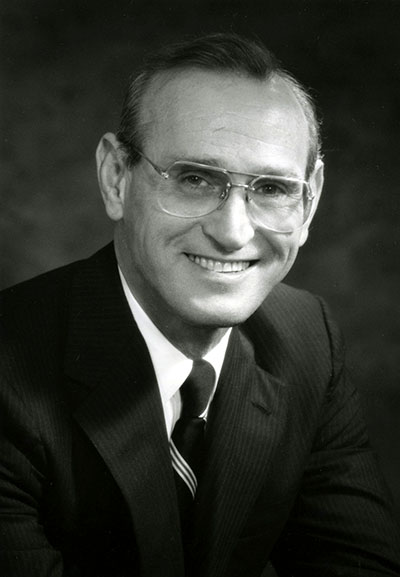 Photo credit: UAB ArchiveWith a heavy heart, the UAB Department of Surgery announces the passing of a transplant hero and pioneer, Dr. Arnold G. Diethelm.
Photo credit: UAB ArchiveWith a heavy heart, the UAB Department of Surgery announces the passing of a transplant hero and pioneer, Dr. Arnold G. Diethelm.
Dr. Diethelm was a native of Baltimore, Maryland. His career at UAB began in 1967 when he joined the UAB Department of Surgery, upon the completion of his two-year fellowship at Harvard, at the invitation of Dr. John W. Kirklin.
When Dr. Diethelm joined the faculty, he said “yes” to the challenge of building a nationally-recognized transplantation program from the ground up. The first kidney transplant in Alabama took place in 1968, followed by the first heart transplant in the Southeast in 1981. These milestones were followed by the first liver transplant in the state in 1983, the first simultaneous pancreas/kidney transplant in 1988 and the first lung transplant in 1989.
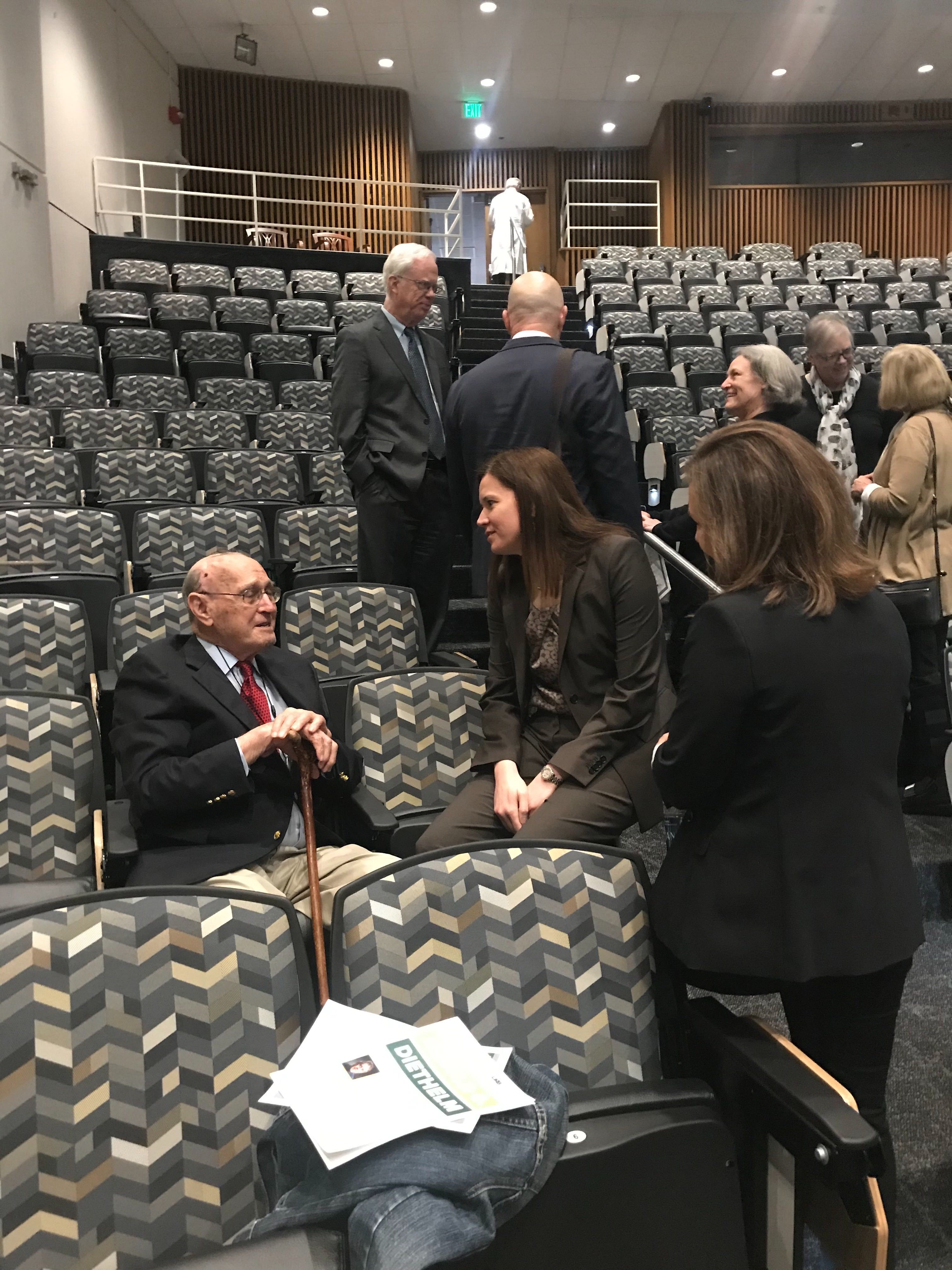 Dr. Diethelm with Dr. Locke and Martha TankersleyDr. Diethelm was the author or co-author of more than 210 publications in peer-reviewed journals, has served as a member of 26 surgical societies, as well as the chair of the UAB Department of Surgery from 1982 to 1999, and was been honored with numerous memberships, awards, visiting professorships and appointments. He was president of the American Society of Transplant Surgeons from 1991-1992– the premier organization for transplant surgeons across the nation– and used his platform to advocate for improved education and training, sharing of knowledge, and equitable organ sharing.
Dr. Diethelm with Dr. Locke and Martha TankersleyDr. Diethelm was the author or co-author of more than 210 publications in peer-reviewed journals, has served as a member of 26 surgical societies, as well as the chair of the UAB Department of Surgery from 1982 to 1999, and was been honored with numerous memberships, awards, visiting professorships and appointments. He was president of the American Society of Transplant Surgeons from 1991-1992– the premier organization for transplant surgeons across the nation– and used his platform to advocate for improved education and training, sharing of knowledge, and equitable organ sharing.
“Dr. Diethelm was a pioneer and leader of transplantation at UAB and across the nation,” said Locke. “But, to those around him, he was known more for his humility and kindness. He was always quick to give credit to his team before himself.” said Jayme Locke, M.D., MPH, director of the UAB Division of Transplantation and the Comprehensive Transplant Institute.
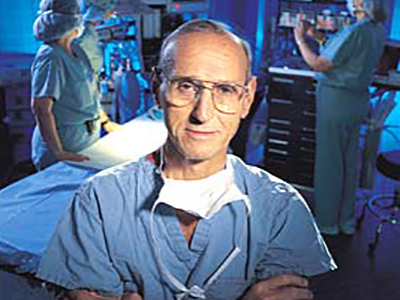 Photo credit: Marc Bondarenko
Photo credit: Marc Bondarenko
As Chair of the Department of Surgery, Dr. Diethelm catapulted the department into the elite group of top five institutions for National Institutes of Health (NIH) funding. The NIH is the largest public funder of biomedical research in the world, investing more than $32 billion a year to enhance life, and reduce illness and disability.
“Dr. Diethelm set the standard of excellence in research, education and patient care for the Department of Surgery and for transplant across the nation,” said Herbert Chen, M.D., FACS, chair of the Department of Surgery. “He announced to the world that our department would be a leader in the field of transplantation, and our incredible faculty, staff and trainees continue to carry out his legacy every day.”
Dr. Diethelm recalled one of the highlights of his career in 1974, when he was appointed visiting scientist in the Division of Surgical Science and the Division of Cryobiology at the Clinical Research Centre in Middlesex, England. Working in the field of immunology under the distinguished Sir Peter Medawar, the experience led to a lifelong interest in the field of immune tolerance. His research grew the field of transplantation, and because of his dedication, UAB has emerged as a leader in the exploration of new immunosuppressive agents.
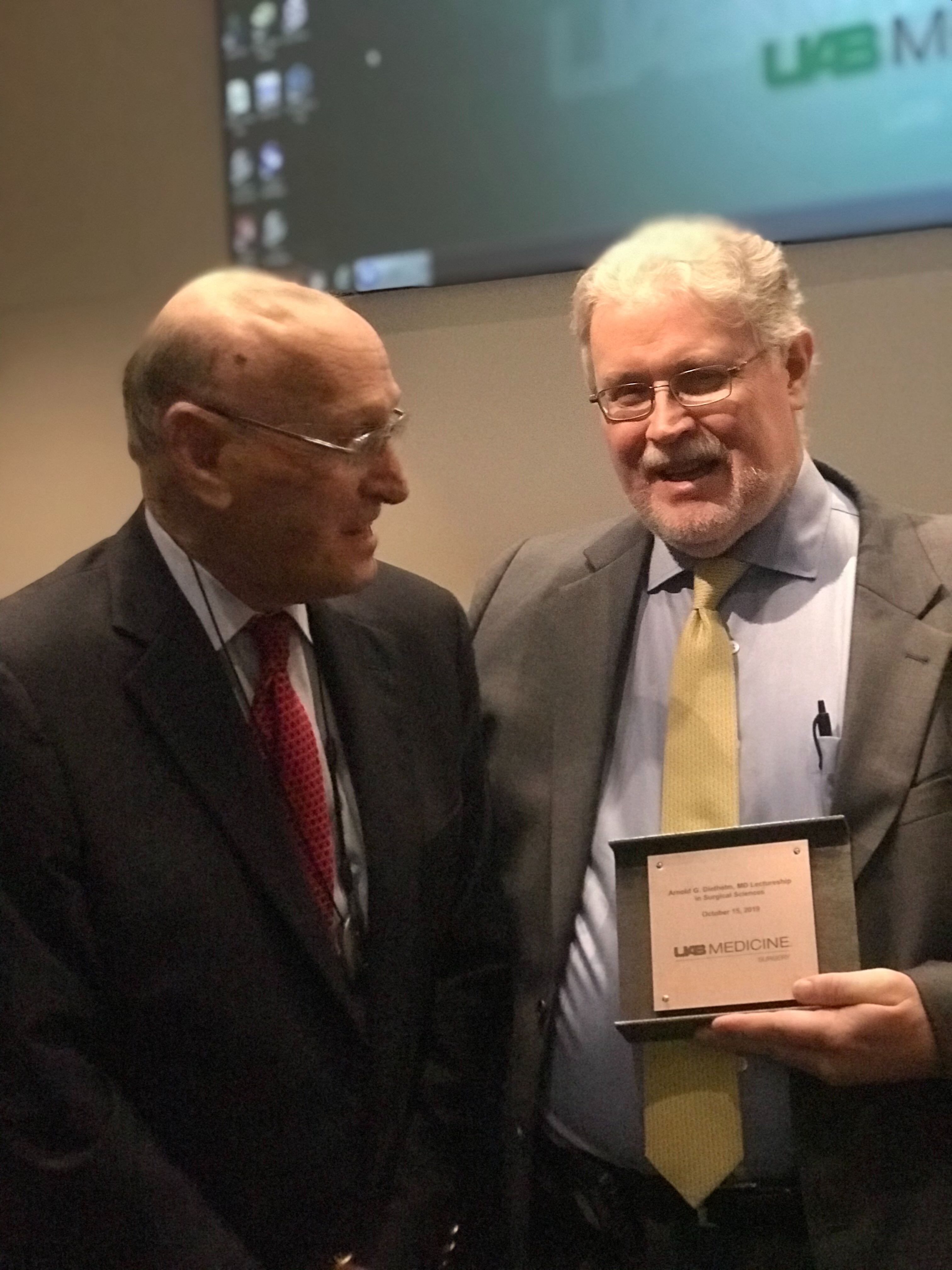 Dr. Diethelm with the late Dr. Deierhoi
Dr. Diethelm with the late Dr. Deierhoi
Around 1999, Dr. Diethelm himself suffered from end-stage liver disease and underwent a successful liver-transplant operation.
“I went through all of that very well and I am a very lucky person,” said Dr. Diethelm. “I realize that it is more luck to get the organ; it takes skill to make it work. And it takes a lot of work by a lot of people, the surgeons, the nurses, all of the other physicians that played a role.”
Under Dr. Diethelm’s leadership, UAB’s renal transplant program became one of the largest and busiest in the nation. In addition, he helped develop the Alabama Organ and Tissue Procurement Centers, expanding supply of critical tissues for bone allograft transplantation. The UAB School of Medicine awarded Dr. Diethelm its highest award by naming him the Distinguished Faculty Lecturer in 1994. He was also inducted into the Alabama Healthcare Hall of Fame.
The Department of Surgery founded The Arnold G. Diethelm Lectureship in Surgical Sciences to foster the type of pioneering vision and dedicated work for the betterment of medicine that Dr. Arnold G. Diethelm exemplified. When UAB celebrated its 50th anniversary of its first transplant in Alabama, Dr. Diethelm, who played a large role in the first transplant, instead turned the spotlight toward support staff.
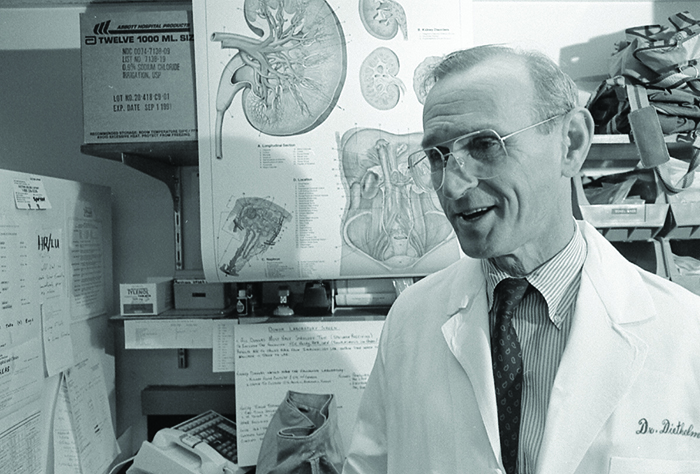 “Who picks up the patient and brings them to the operating room on a stretcher?” asked Dr. Diethelm. “Who washes and sterilizes that OR? Surgery requires a large number of people, and those people may be the most important.”
“Who picks up the patient and brings them to the operating room on a stretcher?” asked Dr. Diethelm. “Who washes and sterilizes that OR? Surgery requires a large number of people, and those people may be the most important.”
If you would like to honor the life and work of Dr. Diethelm, we encourage you to give to a UAB transplant fund or to the UAB Comprehensive Transplant Institute.